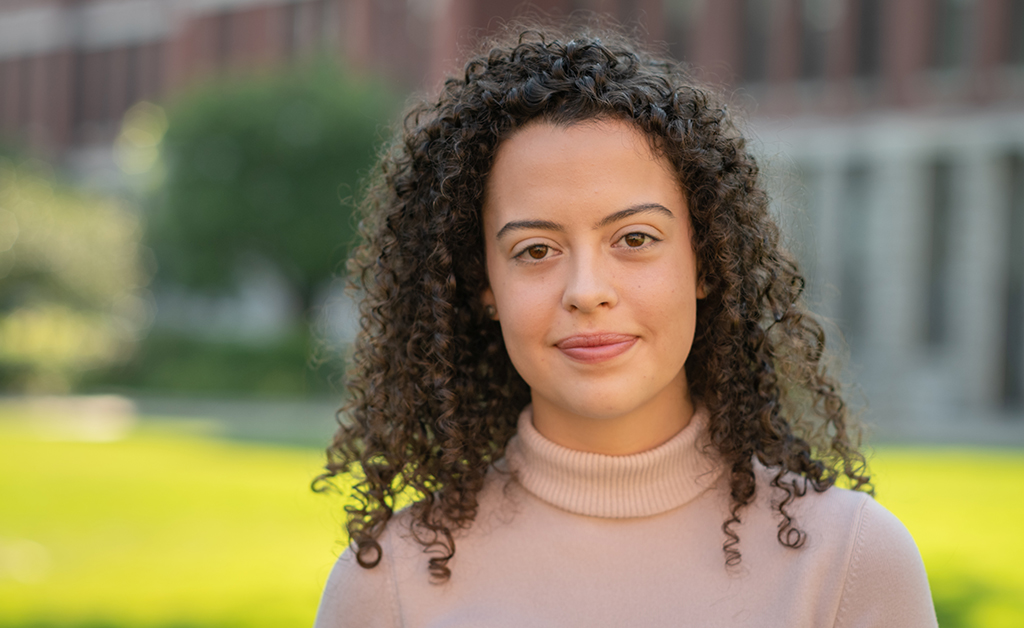Clark student helps develop nationwide survey for transition-to-college study

The transition from high school to college can be many things — daunting, thrilling, illuminating, overwhelming, liberating. There are as many responses to that first year at college as there are students. No individual’s experience exactly mirrors that of another.
Raquel Jorge Fernandes ’23 knows this all too well. As a recent immigrant from Brazil, she arrived at Clark three years ago, still adjusting to her adopted country while also navigating the academic, cultural, and social differences of a new campus. She adapted, then she thrived.
This summer, supported by a LEEP Fellowship, Fernandes has the opportunity to participate on the research team of a study designed to better understand the particular challenges students face when transitioning to college — with an emphasis on international, immigrant, and first-generation immigrant students.
Working with Professor Nancy Budwig and the Higher Education Research group at Clark, the psychology major is sending out a nationwide survey to students who have completed their first year of college to address issues like self-esteem, well-being, and identity. She will also be analyzing transcripts of interviews with students to gather more in-depth testimony about the complexities involved with adjusting to college.
Fernandes draws on personal experience when referencing the unique challenges facing international students. She notes that higher education in Brazil, where she completed a semester before immigrating, is more lecture-based — a student typically raises their hand only to ask a question. Here, especially at colleges that value liberal education, students not only are expected to engage in class discussions but often are graded on their level of participation.
“No one prepared me for that,” she recalls. “The idea of speaking up to disagree with someone made me nervous. I’m hoping that professors can be better prepared to deal with this and create a more inclusive environment for students of different cultures.”
Clark’s academic programs, she says, place great value on strong writing, a skill that is not always encouraged in other countries’ educational systems — and which can be a difficult adjustment for international students. Social norms are also different. A student in Brazil typically establishes a network of friends in the classroom; here, those friendships are cultivated within clubs, she says.
“Students who are immigrants may come from homes that value certain things, and when they arrive at college, suddenly those things are not valued in the same way,” she says. “Learning is different in every culture, and higher education in the U.S. offers a very specific model of learning. It’s structured in a way that’s not universal — it’s more practice-based and expects students to know how to think critically. I’m curious how students learn a different value system for education than what they’re used to, and how they transition to it, or not.”
Fernandes had her first research experience when she assisted Professor Sarah Michaels in a study of students at South High School in Worcester for whom English was their second language. The experience of observing the students in the classroom resonated with her on a personal level, as she recalled her own family’s struggles to assimilate, and she enjoyed witnessing the South High Students grow in confidence throughout the year.
“It gave me an appreciation for the impact of education,” Fernandes says.
While at Clark, Fernandes has served as a student ambassador in the Admissions Office and is in her third year as a peer mentor to first-year students. She joined Budwig’s research lab to participate in the professor’s study of student transitions to college, and earlier this summer presented findings at the Jean Piaget Society for the Study of Knowledge and Development conference in Philadelphia. The ideas she’s generated from that research will form the basis for her honors thesis.
This is not Ferdandes’ first major research project about the international experience and the challenges to an easy transition posed by one’s cultural background. Last year, as a Steinbrecher Fellow, she created a vibrant and candid documentary film exploring the lives of Brazilian immigrants in Massachusetts.


